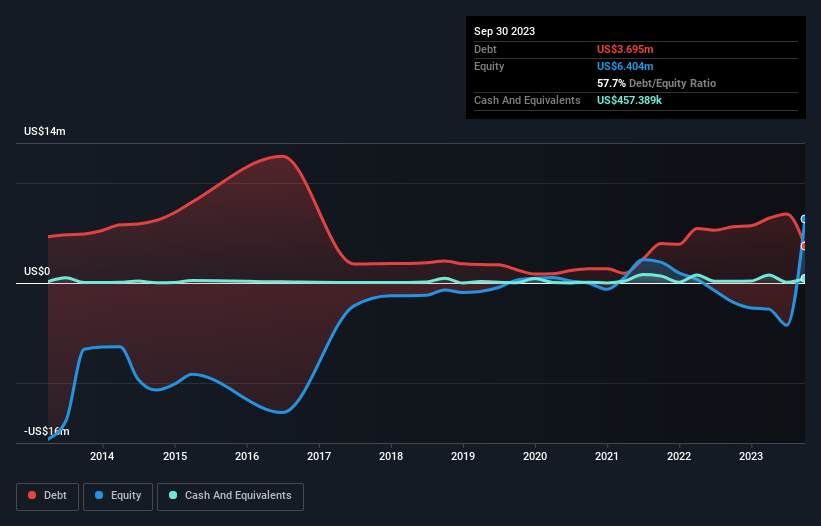David Iben put it well when he said, 'Volatility is not a risk we care about. What we care about is avoiding the permanent loss of capital.' So it seems the smart money knows that debt - which is usually involved in bankruptcies - is a very important factor, when you assess how risky a company is. We note that iCoreConnect Inc. (NASDAQ:ICCT) does have debt on its balance sheet. But the real question is whether this debt is making the company risky.
Why Does Debt Bring Risk?
Debt is a tool to help businesses grow, but if a business is incapable of paying off its lenders, then it exists at their mercy. Ultimately, if the company can't fulfill its legal obligations to repay debt, shareholders could walk away with nothing. While that is not too common, we often do see indebted companies permanently diluting shareholders because lenders force them to raise capital at a distressed price. Having said that, the most common situation is where a company manages its debt reasonably well - and to its own advantage. The first step when considering a company's debt levels is to consider its cash and debt together.
See our latest analysis for iCoreConnect
How Much Debt Does iCoreConnect Carry?
As you can see below, iCoreConnect had US$3.70m of debt at September 2023, down from US$5.62m a year prior. However, it does have US$457.4k in cash offsetting this, leading to net debt of about US$3.24m.

How Healthy Is iCoreConnect's Balance Sheet?
Zooming in on the latest balance sheet data, we can see that iCoreConnect had liabilities of US$9.00m due within 12 months and liabilities of US$1.00m due beyond that. Offsetting this, it had US$457.4k in cash and US$597.7k in receivables that were due within 12 months. So it has liabilities totalling US$8.95m more than its cash and near-term receivables, combined.
This deficit is considerable relative to its market capitalization of US$12.7m, so it does suggest shareholders should keep an eye on iCoreConnect's use of debt. This suggests shareholders would be heavily diluted if the company needed to shore up its balance sheet in a hurry. The balance sheet is clearly the area to focus on when you are analysing debt. But you can't view debt in total isolation; since iCoreConnect will need earnings to service that debt. So when considering debt, it's definitely worth looking at the earnings trend. Click here for an interactive snapshot.
Over 12 months, iCoreConnect saw its revenue hold pretty steady, and it did not report positive earnings before interest and tax. While that's not too bad, we'd prefer see growth.
Caveat Emptor
Over the last twelve months iCoreConnect produced an earnings before interest and tax (EBIT) loss. Its EBIT loss was a whopping US$7.4m. When we look at that and recall the liabilities on its balance sheet, relative to cash, it seems unwise to us for the company to have any debt. Quite frankly we think the balance sheet is far from match-fit, although it could be improved with time. Another cause for caution is that is bled US$3.7m in negative free cash flow over the last twelve months. So in short it's a really risky stock. When analysing debt levels, the balance sheet is the obvious place to start. However, not all investment risk resides within the balance sheet - far from it. Be aware that iCoreConnect is showing 4 warning signs in our investment analysis , and 3 of those shouldn't be ignored...
Of course, if you're the type of investor who prefers buying stocks without the burden of debt, then don't hesitate to discover our exclusive list of net cash growth stocks, today.
Valuation is complex, but we're here to simplify it.
Discover if iCoreConnect might be undervalued or overvalued with our detailed analysis, featuring fair value estimates, potential risks, dividends, insider trades, and its financial condition.
Access Free AnalysisHave feedback on this article? Concerned about the content? Get in touch with us directly. Alternatively, email editorial-team (at) simplywallst.com.
This article by Simply Wall St is general in nature. We provide commentary based on historical data and analyst forecasts only using an unbiased methodology and our articles are not intended to be financial advice. It does not constitute a recommendation to buy or sell any stock, and does not take account of your objectives, or your financial situation. We aim to bring you long-term focused analysis driven by fundamental data. Note that our analysis may not factor in the latest price-sensitive company announcements or qualitative material. Simply Wall St has no position in any stocks mentioned.
About OTCPK:ICCT
iCoreConnect
A cloud-based software and technology company, develops and markets health insurance portability and accountability act (HIPAA) compliant cloud-based software as a service (SaaS) in the United States.
Moderate risk and slightly overvalued.
Market Insights
Community Narratives




